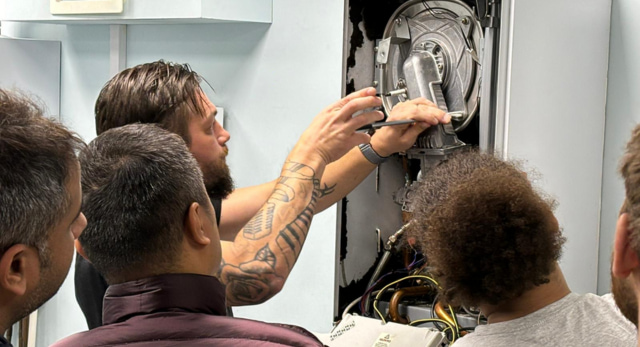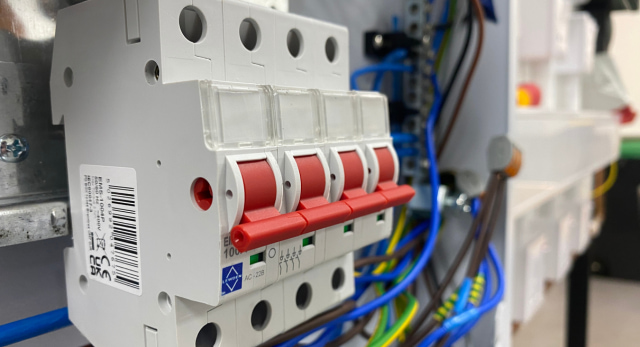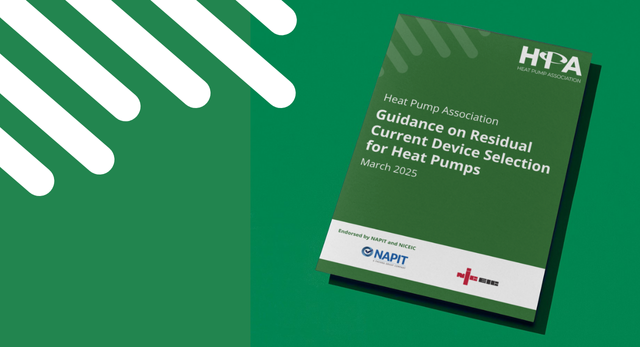Passed your ACS gas exams? Discover how to register with Gas Safe, navigate your probationary period, and start your gas engineering career successfully in 2025. Learn all about the registration costs, legal requirements, and essential tools needed for your first inspections.
What is the Gas Safe Register?
The Gas Safe Register is the official regulatory body for gas engineers and businesses in the UK, Isle of Man, and Guernsey. It was established in 2009, replacing Corgi, and operates on behalf of the Health and Safety Authority in each region.
Legally, all businesses working with gas must be registered with the Gas Safe Register.
What Does the Gas Safe Register Do?
The Gas Safe Register has several key responsibilities to ensure safety and compliance in gas-related work:
Maintaining a Register of Qualified Engineers
It manages the official list of gas businesses and engineers who are certified to work legally with gas appliances.
Enforce Standards in Gas Work
The organisation monitors the quality of work performed by its members and identifies unqualified or illegal installers. It is authorized to impose penalties for rule violations and report cases to the Health and Safety Executive (HSE). Registered engineers are issued a Gas Safe ID card as proof of their qualifications.
Inspecting and Investigating
The Gas Safe Register conducts inspections of registered businesses and investigates complaints about unsafe gas work. This helps enforce the Gas Safety (Installation and Use) Regulations 1998 as well as relevant Building Regulations.
Educating the Public on Gas Safety
It runs campaigns to inform consumers about gas safety risks, such as carbon monoxide poisoning and the dangers of hiring unregistered engineers. The organization also hosts an annual Gas Safety Week to raise awareness and promote safe practices.
By fulfilling these roles, the Gas Safe Register ensures that gas work across its jurisdictions is carried out safely and legally.
Understanding Gas Safe Registration Requirements
Completing your ACS gas exams is a significant milestone in your journey to becoming a qualified gas engineer, but it’s just the beginning. The most critical next step is registering with the Gas Safe Register, which is a legal requirement for anyone conducting gas work in the UK under the Gas Safety (Installation and Use) Regulations 1998.
Without this registration, you cannot legally install, service, or repair gas systems, and attempting to do so could result in significant fines and legal action. Registration not only ensures you’re operating within the law but also builds trust with customers who look for the Gas Safe card as proof of competence.
2025 Registration Costs and Fees
As of April 2025, the costs for Gas Safe registration have been updated. New applicants should be prepared for the following fees:
- New application cost: £386.70 including VAT (covers one engineer and initial registration for one year)
- Online renewal: £214.84 including VAT
- Offline renewal: £239.39 including VAT
- Late renewal penalty: £159.59 including VAT
If you’re VAT-registered, these fees can be reclaimed, which is particularly relevant information for self-employed engineers. There is no strict deadline for registration after completing your exams, but remember that you cannot legally undertake any gas work until your registration is complete.
The Registration Process
The registration process is straightforward and can be completed via the Gas Safe Register website. You’ll need:
- Your ACS qualification details
- A payment method
- Basic personal and business information
For first-time applications, the process typically takes about a week, though some providers like Logic4training offer express options for faster processing. The sooner you register after passing your exams, the sooner you can start working legally.
Navigating the Probationary Period
What to Expect During Probation
Upon successful registration, new gas engineers enter a three-month probationary period. During this time, while you’re fully registered and can perform gas work, your activities will be closely monitored to ensure compliance with Gas Safe standards.
The probationary period serves as a transition phase where you demonstrate your ability to apply your knowledge in real-world situations while adhering to all safety regulations and standards.
Requirements and Job Notifications
One of the key requirements during the probationary period is keeping detailed records and notifying the Gas Safe Register of all completed jobs. This is outlined in Section 3b of the Rules of Registration on the Gas Safe Register website.
Though there’s no explicitly stated minimum number of jobs you must complete during probation, it’s recommended to complete at least one job that can be inspected. This allows you to demonstrate your competence in a practical setting. Failure to provide evidence of work during this period can potentially lead to suspension, making it crucial to secure work shortly after registration.
Record-Keeping Best Practices
Effective record-keeping is essential during your probationary period and throughout your career. Digital platforms like Gas Engineer Software, which partners with Logic4training, can streamline this process by helping you manage scheduling, certificates, and customer information.
Alternatively, you can use a physical notebook or spreadsheet, but whatever method you choose, accuracy and completeness are paramount for potential inspections. Your records should include:
- Customer details
- Date and nature of work
- Appliance information
- Safety checks performed
- Any issues identified and actions taken
Essential Tools and Equipment for Inspections
Tool Checklist for New Gas Engineers
Inspectors expect gas engineers to have a well-equipped toolkit. Based on industry standards, your essential equipment should include:
- A manometer for pressure testing
- Leak Detection Fluid (LDF) for identifying gas leaks
- A calibrated gas combustion analyser for safety checks
- Basic plumbing tools for installation and repairs
These tools are not just for passing inspections; they’re critical for ensuring your work meets safety standards and protects your customers.
Maintenance and Calibration Requirements
Regular calibration of your equipment, especially gas analysers, is non-negotiable in this profession. Inspectors will verify the functionality of your tools during visits, so proper maintenance and storage are essential.
Most manufacturers recommend annual calibration for gas analysers, but always check the specific requirements for your equipment. Keeping records of calibration dates and certificates is also good practice for demonstrating your commitment to safety standards.
Resources and Support for Newly Qualified Engineers
Certificates and Documentation
Logic4training, a leading training provider, offers essential items through its partnership with Gas Engineer Software, including landlord certificates, warning labels, and service certificates. These can be purchased online and ensure you have the necessary documentation for jobs.
Having the correct certification templates ready before you start work will save time and ensure you’re complying with all documentation requirements from the outset.
Ongoing Support Options
After completing your training, many providers like Logic4training continue to offer guidance through their centres across the UK. This support can include refresher courses and resources to help you navigate early career challenges.
Industry forums and local gas engineer networks can also be valuable sources of advice and support as you establish yourself in the profession. Many experienced engineers are willing to mentor newcomers and share their knowledge.
Supplier Relationships and Discounts
For essential tools like Testo analysers, it’s worth contacting suppliers directly as they may offer discounts specifically for newly qualified engineers. This can help reduce your initial setup costs as you establish your business.
Building relationships with suppliers early on can also lead to better service and potential deals in the future, which is particularly valuable as you grow your business.
License Renewal Process and Requirements
Overview and Costs for 2025
The Gas Safe Register will notify you before your registration expires, and renewal can be completed online via their portal. As updated for 2025, renewal costs are:
- £214.84 including VAT for online renewal
- £239.39 including VAT for offline renewal
- With a late penalty of £159.59 including VAT if you miss the deadline
Ensuring timely renewal is crucial to avoid any disruption to your ability to work legally.
Deadlines and Planning
Mark your calendar for renewal well in advance to ensure continuity in your operations. Late renewals can result not only in additional fees but also in periods during which you cannot legally work, directly impacting your income.
Many engineers set up reminders several months before their renewal date to ensure they have plenty of time to gather any necessary documentation and complete the process without rushing.
Conclusion
Earning your ACS qualifications and Gas Safe card represents a significant achievement, but it’s just the beginning of your professional journey. By following the steps outlined in this guide—registering with Gas Safe, preparing for your probationary period, acquiring the right tools, and planning for ongoing requirements—you’ll set yourself up for a successful career as a gas engineer.
Remember these key points:
• Registration with Gas Safe is a legal requirement before undertaking any gas work
• The probationary period is an important time to demonstrate your competence
• Having the right tools and documentation is essential from day one
• Ongoing support and continuous learning will help you thrive in the profession
With thorough preparation and attention to these details, you’ll transition smoothly from newly qualified engineer to established professional in this essential and rewarding field.
FAQ
Can I work immediately after passing my ACS exams?
No. You must complete Gas Safe registration first (typically 1 week processing). Working without registration risks £5,000+ fines and imprisonment under Regulation 3(7) of Gas Safety Regulations.
What happens if I fail a probation inspection?
The Gas Safe Register will:
- Issue an “At Risk” notice requiring immediate corrective action.
- Conduct follow-up inspections within 14 days.
- Suspend registration if faults remain unresolved.
How often must I recalibrate my gas analyser?
Manufacturers recommend annual calibration, but inspectors require proof of calibration within the last 12 months. Logic4training offers discounted calibration services through their partner network.
Is the ACS qualification valid across all UK regions?
Yes, but:
- Northern Ireland has a separate registration via indirect
- Scotland follows the same standards but uses different building regulation codes
What’s the difference between initial ACS and reassessment?
An initial assessment is generally done as part of a new entrant course and is for individuals who are looking to gain their ACS qualifications for the first time or is suitable for gas installers whose existing CCN1 has lapsed by more than 12 months. A reassessment is designed for individuals who are experienced gas installers who need to keep their ACS qualifications up to date.
Can I appeal a failed ACS assessment?
Yes through:
- Internal verification with your training centre
- Independent review via Gas Safe Register complaints
- HSE intervention in safety disputes
Where do I get landlord gas safety certificates?
Approved providers include:
- Gas Engineer Software (digital) via Logic4training
- Logic4trade (physical)









